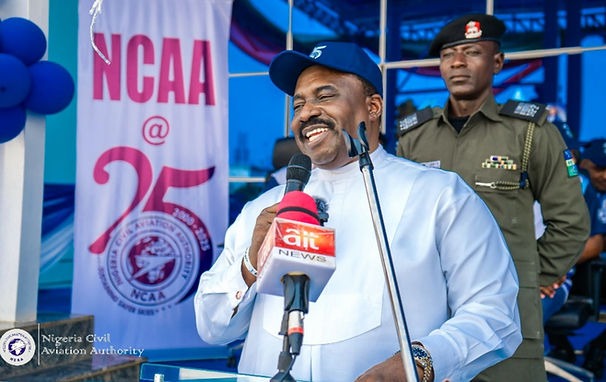NCAA at 25: Minister, DG Pledge Deeper Economic Regulation, Technological Advancements for Safer Aviation

The Minister of Aviation and Aerospace Development, Festus Keyamo, and the Director-General of the Nigeria Civil Aviation Authority (NCAA), Captain Chris Najomo, have reaffirmed the government’s commitment to enhancing aviation safety through deeper economic regulation and technological adaptation.
Speaking at the NCAA’s 25th Anniversary Symposium in Abuja on Saturday, the aviation leaders emphasised the need for continuous improvement in safety measures, stakeholder collaboration, and innovative training programmes to sustain the industry’s growth.
The symposium, themed “Human Capital Development: Upskilling the Next Generation of Aviators,” brought together key stakeholders to reflect on the sector’s progress and future aspirations.
Representing the Minister, the Permanent Secretary of the Ministry, Dr. Ibrahim Abubakar Kana, lauded the NCAA’s achievements over the past 25 years but stressed that maintaining these successes required “deliberate focus on safety planning, stakeholder collaboration, and the adoption of innovative practices, particularly in training and retraining.”
He highlighted that the NCAA’s Silver Jubilee celebration served as a reminder that aviation safety is not a one-time achievement but an ongoing process of adaptation and improvement.
As technology evolves, passenger demand rises, and globalisation accelerates, aviation safety dynamics must continuously evolve to meet new challenges, he added.
Echoing this stance, NCAA’s Director-General, Captain Chris Najomo, called for a forward-thinking approach, emphasising the need to “embrace new technologies, improve operational efficiencies, and foster partnerships that will elevate our aviation industry to even greater heights.”
“In propelling NCAA to aspirational heights, and in line with this symposium, we are faithfully guided by the Honourable Minister’s Five-Point Agenda and ultimately Mr. President’s Renewed Hope Agenda, both of which emphasise infrastructure development, safety enhancement, economic growth, and job creation,” Najomo stated.
He assured stakeholders that NCAA would continue to uphold the highest standards of safety, efficiency, and global best practices in the coming years.
To strengthen its regulatory framework, the DG announced that a team of International Civil Aviation Organisation (ICAO) trainers had been invited to equip NCAA personnel with enhanced skills in economic regulation.
Keynote speaker and former Rector of the Nigerian College of Aviation Technology (NCAT), Samuel Akin Caulcrick, underscored the importance of investing in subsidised aviation training to build a skilled and diverse workforce that would drive the industry’s future growth.
“As we envision the future, prioritising human capital development in aviation is paramount. We must invest in the next generation of aviators, equipping them with skills and training that will propel our industry to exceptional heights,” Caulcrick said.
Dr. Anastasia Gbem, NCAA’s Director of Human Resources and Administration, who also chaired the NCAA @25 Planning Committee, reaffirmed the Authority’s commitment to sustaining high safety standards.
“Safety in our skies cannot be achieved without human capital. Human capital is one of the most critical assets of any organisation that seeks success. At NCAA, we prioritise continuous development in this regard,” she stated.
Chief Operating Officer of Ibom Air, Mr. George Uriesi, commended the NCAA’s regulatory efficiency, citing its firm and professional oversight.
“I know how effectively Ibom Air is regulated. The NCAA is highly professional, ensuring that all operators adhere to industry best practices, regardless of any existing relationships,” Uriesi remarked.
Similarly, the Deputy Chairman of the Senate Committee on Aviation praised the NCAA’s role in maintaining order and compliance within the sector, commending its achievements in the past 25 years.
With this milestone, there is optimism that deeper economic regulation, technology-driven reforms, and sustained human capital development would position Nigeria’s aviation industry for greater global competitiveness in the years ahead.







